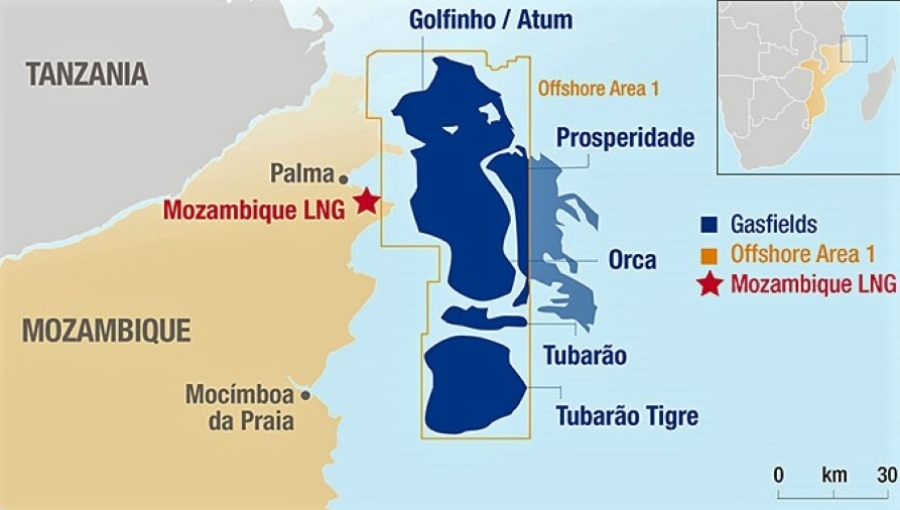More problems for Mozambique LNG

Latest ASWJ campaign in Cabo Delgado appears to be directed at Total’s $20bn mega-project
WHAT: ASWJ has attacked a village just a few kilometres away from the site of Mozambique LNG’s onshore complex.
WHY: The Islamist group is now openly targeting the gas project, according to a Mozambican Defence Ministry spokesman.
WHAT NEXT: Since attacks on gas facilities attract attention, ASWJ is likely to step up its campaign in the near future.
Cabo Delgado, the northernmost province in Mozambique, is under siege once again. On March 24, Ahlu Sunnah Wa-Jamo (ASWJ), the Islamist group that has been attempting to seize control of the province, launched an attack on the village of Palma on the Afungi Peninsula. Mozambique’s armed forces, known as Forças Armadas de Defesa de Moçambique (FADM), have retaliated, but the outcome of the battle has not yet been decided.
The human cost of ASWJ’s latest campaign is sure to be steep. According to press reports, dozens of people have been killed, and thousands have fled the area.
Unfortunately, the violence is not likely to end any time soon. Even if FADM manages to retake the town relatively quickly – and its ability to accomplish this is not assured – ASWJ has already achieved one of its goals. That is, it has succeeded in causing further problems for Mozambique LNG, the consortium led by Total (France) that is trying to build a natural gas liquefaction plant just a few kilometres outside Palma within the framework of a wider investment project worth $20bn.
In turn, Total’s problems are a major source of concern for the Mozambican government. Officials in Maputo hope to see two more consortia – Coral South LNG, led by Eni (Italy), and Rovuma LNG, led by ExxonMobil (US) – join Mozambique LNG in developing the country’s offshore fields and turning the country into an exporter of gas. Together, these three projects will require investments of $50bn or more. They will generate billions of dollars in revenue for the government, and they are likely to create thousands of jobs. (Some of these jobs will emerge directly, through the hiring of local workers and the contracting of local service firms, and some will emerge indirectly, through the local businesses that are likely to spring up to serve those involved in gas production, transportation and processing.)
Human and political costs
As such, the stakes are high – and they have been for some time, even if one ignores the vast sums of money involved in the gas projects.
For one thing, the conflict has been grinding on for more than three years. Mozambique’s government and FADM have been fighting ASWJ since October 2017, and the conflict has already led more than 700,000 people to flee their homes. According to UNHCR, the refugee agency of the United Nations, the number of displaced people could climb to 1mn by mid-year if the crisis does not abate.
For another, the conflict has the potential to wreak a certain amount of havoc in the region. Since ASWJ functions as the local arm of the terrorist group known as Islamic State (Daesh), its clash with FADM has wider geopolitical implications. It could also spur diplomatic tensions between Mozambique and neighbouring states, some of which have already expressed concern about the possibility that refugees from Cabo Delgado may cross into their territory.
Another ramp-down
These considerations are serious enough on their own. But they look even more serious in light of the large-scale investments contemplated by Mozambique LNG and the other consortia – and in light of the fact that ASWJ is now openly targeting project sites.
In recent months, the Islamist group’s troops have been moving closer and closer to the complex that Mozambique LNG is building on the Afungi Peninsula. Last August, they forced Total to stop using the port of Mocimboa da Praia as its main delivery point for equipment needed to build the LNG plant. Last November and December, they staged a series of attacks that led the French company to ramp down operations and evacuate thousands of workers from its onshore construction site in January.
These events have thus far not deterred Total. The French major has remained committed to resuming work and has been in negotiations with Mozambican authorities on the establishment of a security perimeter in the area. These talks appear to have been fruitful, and Total was indicating before March 24 that it intended to resume work before the end of the month.
However, these hopes have now been dashed. Rather than returning workers to the Afungi Peninsula site and stepping up the pace of construction, Total has evacuated more staff members and scaled back operations once again. Instead of remaining secure within the perimeter marked out by Mozambique’s government, it has seen ASWJ ambush hotels in Palma where some of its employees were taking shelter. Additionally, rather than working to keep itself out of the fray, it has heard Mozambican officials such as Omar Saranga, a spokesman for the Ministry of Defence, inform the public that the Islamists are deliberately and specifically targeting gas projects.
Lessons to be learned
Mozambique’s government is seeking help from the international community, in that it has moved beyond working with foreign security contractors with unsavoury reputations such as South Africa’s Dyck Advisory Group (DAG). It has accepted Portugal’s offer of military training and has brought US military advisors and special forces into the country for counter-terrorism training.
Even so, ASWJ has seen that attacks on gas installations get results. They may not lead to clear territorial gains, but they do attract a great deal of attention (and they may also be encouraging Islamic State loyalists to travel to Mozambique). Additionally, they bring FADM troops to Cabo Delgado, thereby exacerbating long-standing tensions between the province and the central government while creating even more disorder.
As such, ASWJ may very well step up attacks on Mozambique LNG facilities in the near term. Officials in Maputo will therefore have to demonstrate their commitment to turning the tide in order to reassure Total – and the other investors that hope to learn from its example.





Follow us online